Wed 4 Jun 2014
A Storied Existence: My Uncle Eichi
Posted by Clare under American in Ireland, Asian food Dublin, Japanese in Dublin, Japanese in Ireland
[3] Comments
(L-R: My grandfather (Ojiisan), Aunt Kyoko, Aunt Hiroko, grandmother (Obaachan), Uncle Eichi, my mother, who is the baby of the family, and Aunt Yoko)
My uncle has always been a dreamlike figure to me, someone who I know only through stories my mother told me. He was gone long before I was born, but that fact has never affected my fascination with him and his story.
He was born in the late 1920s in Osaka, Japan, an intolerant era for people born with any sort of visible disability. Because he had club hands and a limp when he walked, it begs to wonder if he ever had a chance at a normal life in a time where ignorance often led to discrimination. My mother told me about how when Eichi needed help finding something in a shop, some clerks would simply ignore him and pretend he wasn’t there.
Some would ask him directly what his mother had done to be given such an imperfect son. I always imagine those hurtful words being spoken with particular emphasis, considering he was the first and only son in the family – a position that, under normal circumstances, would have been acknowledged and even celebrated many times throughout his life.
Though he was loved greatly by his own family the steady rejection and subsequent humiliation led him to associate with some unsavoury characters. I imagine these guys, for all their questionable choices, were likely more accepting of Eichi than others he encountered in his life. While I don’t know the details I understand he got into some shady dealings an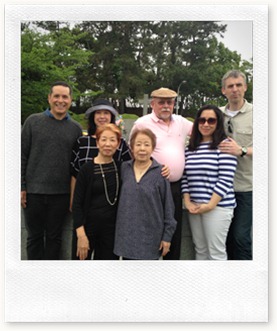 d borrowed money from my Ojiisan’s clients, which ultimately led to my grandfather cutting off contact with him (though my Obaachan continued to visit him in secret).
d borrowed money from my Ojiisan’s clients, which ultimately led to my grandfather cutting off contact with him (though my Obaachan continued to visit him in secret).
At some point he contracted tuberculosis and was put into a hospital on a long-term basis. It was there that he began exchanging letters with a woman, Fukue-san, through the hospital’s pen-pal program. She knew all to well the difficulties of a physical disability: plagued with terrible rheumatoid arthritis, she was unable to sit, stand or walk on her own. Unable to care for herself she lived with her sister and her sister’s family in Konoshima, a beautiful island in the Japan Inland Sea. Despite her condition, my mother tells me she was a very kind, positive and lovely woman who wrote encouraging letters and poems to others who were bed-bound and lonely.
I believe Eichi fell in love with this woman through her letters, and in a desperate bid to meet her in person he faked a note to leave the hospital one hot, summer afternoon. But he was so ill he barely made it to her home; upon arrival he coughing up blood. Fukue-san’s brother arranged for a private boat to take Eichi back to the hospital. He passed away a few months later, never fulfilling his desire to spend more time with the woman whose letters inspired him so greatly.
But his life was not without glimmers of hope and happiness. A clear memory my mother has is of Eichi limping down the street on her birthday, carrying in his arms a shiny, red tricycle for his little sister. My image of him always includes that memory – a thoughtful and kind brother, probably wishing his legs would move faster as he saw my mother’s eyes widen with anticipation at the sight of her birthday present.
A few weeks ago on a family trip to Japan, I met Eichi at his final resting place in Osaka. He’s been there for over 52 years now, but not alone. My Ojiisan and Obaachan, who outlived their son by decades, are there next to him. Unbeknownst to anyone else, my Ojiisan had finally reconciled with his son after his death. My mother found out many years later that my grandfather had quietly paid for maintenance expenses of Eichi’s grave for many years after he passed away.
It was good to go and pay our respects as a family, and to acknowledge in person the uncle I’d never met.
Cold Soba Noodles with Dipping Sauce
After we visited the grave that day, my family and I had a quick lunch at the train station near the cemetery. Like many days on this trip, we enjoyed cold soba noodles – a very popular dish during the summertime in Japan. It’s a taste that always brings back fond memories for me, as I ate it often when visiting my Ojiisan and Obaachan in Osaka.
You can buy all the ingredients below at Asia Market or Oriental Emporium in Dublin.
1 packet of soba noodles (typically about 180 grams in one pack)
1 packet of Dashi granules (about 1.5 tablespoons)
1 tablespoon soy sauce
1 teaspoon freshly-grated ginger
2 spring onions, sliced
Fill a medium-sized pot with water and bring to a boil. Put in the soba noodles and cook for about 5-6 minutes. While the soba is cooking, prepare a large bowl of ice water and set aside.
Drain the soba noodles and immediately put it into the ice water. Let sit for 5 minutes. While you’re waiting for the soba noodles to cool down, mix 400 mls of hot (not boiling) water with the Dashi granules, grated ginger and soy sauce and mix until the Dashi is dissolved. Divide the liquid (which is your dipping sauce) into two small bowls.
Drain the noodles and shake off any excess water. Divide the noodles onto two plates, top with sliced spring onions and serve with the dipping sauce. Using chopsticks, pick up a bite or two worth of noodles, dip into the sauce and slurp it right up! Enjoy!

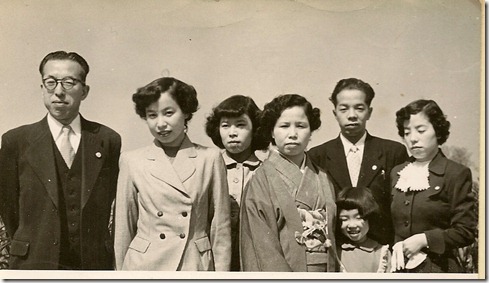
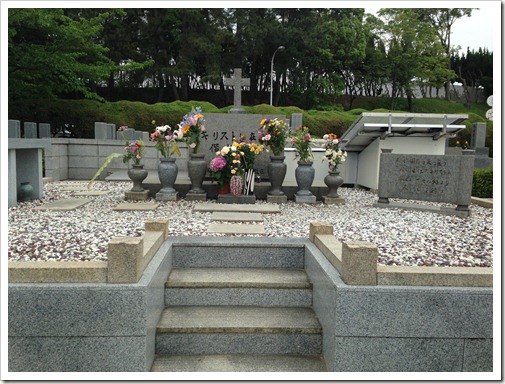
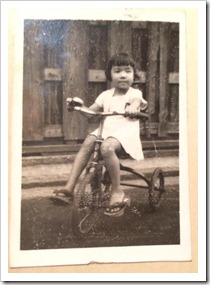
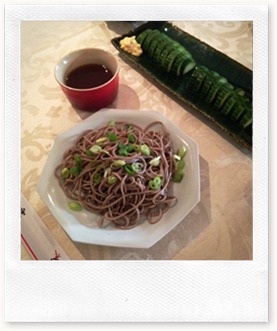


Very touching story Clare. It reminded me of the difficult times different able people have to face every day. With a sister on a wheelchair, I only know too well that ignorance is hurtful. Love the fact that your mam has such a beautiful memory.
Thanks, Lily 🙂
Beautiful story and beautifully written! I bet your Uncle is smiling over this touching tribute to him.